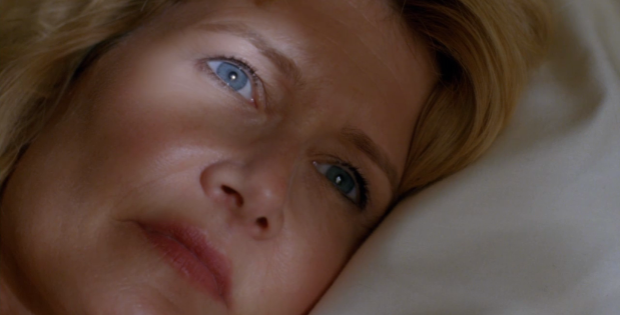
Amy: I don’t want the same old sad story. I want a new story.
Levi: It will be new. It’ll be brand new. You know? That’s the beauty of it. It can be like grace.
Amy: Grace?
Levi: Yeah, life is beautiful.
In her essay “In Praise of Vulgar Feminism,” Agata Pyzik considers the star personae and feminist salience of two women who represent “mirror images of the Nineties”: Kim Gordon and Courtney Love. After comparing the highbrow and remotely cool Gordon with Love, whom she describes as “kitschy, exhibitionistic, shameless, and at the same time vulnerable and ready to show it,” Pyzik concludes that Love better captures the spirit of a third-wave feminism that took shape throughout the 1990s and remains relevant today. With her flawed yet powerful presence—in essence, her flagrant lack of grace—Love has proven capable of electrifying others and perfectly embodying the “vulgar feminism” that Pyzik praises. As put by Nicole Solomon, whom Pyzik quotes, Love has given women permission “to express [themselves], including the parts of [themselves] that society may deem ugly and inappropriate,” in the process challenging conventional definitions of femininity.
It is Love and the kind of feminism she represents that comes to mind when I consider another shameless woman, one who occupies an entirely different world: Amy Jellicoe (Laura Dern), the protagonist of Mike White and Laura Dern’s series Enlightened (2011–2013), which ran for two seasons on HBO. Committed to social justice yet blithely solipsistic, hungry for connection yet tone-deaf to social dynamics, aware of social mores but too impulsive to respect them, Amy is a leading woman of the most maddening kind. Indeed, multiple people to whom I have enthusiastically recommended Enlightened can’t get past the first few episodes because she is so difficult to bear, never mind like. Yet as the series wears on and it becomes clear to what extent Amy’s tendency to induce cringe goes hand in hand with her capacity to effect change, the very characteristics that make her so abrasive also inspire a kind of admiration. In this way, Enlightened carefully considers the nature of grace and the role it might, or might not, play in any contemporary social movement, including feminism.
The opening scene of Enlightened’s pilot features a devastated Amy—mascara streaming down her face, despair contorting her features—in the throes of a breakdown while at her workplace, the corporate offices of Abaddon Industries. Having just learned that, in the wake of an affair with her boss, Damon, she is being relocated from the health and beauty division, where she is head buyer, to cleaning supplies, she is hell-bent on salvaging her old job. To this end she confronts Damon, first begging and then berating him, as he boards an elevator with two male associates. The doors close and the three men assume with bemused relief that they have escaped the tirade—but Amy pries the doors open and screams, “I will destroy you. I will bury you. I will kill you, motherfucker.” As the last syllable erupts into a primal scream, a freeze frame captures her rage and desperation in close-up.
Immediately following this explosive opening, the screen fades to black. As a new scene begins, complete with imagery of a majestic tree and serene non-diegetic music, Amy intones via a calm, heartfelt and dulcet voice-over the lessons she learned while at a treatment centre in Hawaii subsequent to her breakdown:
I’m speaking with my true voice now, without bitterness or fear. And I’m here to tell you you can walk out of hell and into the light. You can wake up to your higher self. And when you do, the world is suddenly full of possibility, of wonder and deep connection. You can be patient, and you can be kind. You can be wise and almost whole. You don’t have to run away from life your whole life. You can really live. You can change, and you can be an agent of change.
With this narration, Enlightened sets the agenda that Amy pursues, with varying degrees of success, throughout the rest of the series. Moreover, it introduces the tension that lends the series, especially its first season, so much of its dramatic and comedic appeal: the extreme disjuncture between Amy’s intentions, desires, and hopes, which are typically articulated in voice-over, and her actual behaviour, which is on display in every awkward move and knee-jerk reaction she makes. In light of this tension, Amy is a figure ripe for satire. Yet what Enlightened does instead—and to great political effect—is save its sharpest critical bite for the social context in which Amy labours, one produced by contemporary corporate culture and the neoliberal values with which it is inextricably linked.
As Amy explores various methods of effecting change in that context—from the practice of meditation, to collectivist actions such as strikes and demonstrations, to corporate whistle-blowing—the show provides both an outlet and a context for her naive hope and abject outrage. In so doing, it normalizes Amy, despite all of her foibles, while rendering strange the impassivity of her colleagues and, more broadly, the codes of neoliberalism by which they live. In short, the show ends up satirizing Amy’s milieu, rather than Amy herself, while she fumbles her way toward something “like grace.”

After her stint in Hawaii, Amy returns to Abaddon to discover that she is no longer even considered capable enough for the cleaning supplies department. Instead, she is being demoted to the basement, where all the company misfits are employed doing data entry. Throughout the first season, her dual interest in self-improvement and social reform leads her to lobby for the creation of a new position at Abaddon, as head of an internal watchdog unit that would brainstorm ways for the company to become a more responsible corporate citizen. However, just like her efforts to get her coworkers doing yoga, joining a worksite women’s group, or rallying around various political causes after hours, her request for a new position is met with a combination of ambivalence, ridicule and outright refusal.
As a result, by the second season Amy changes tacks. Convinced that creating change from within is impossible, she takes advantage of the insider knowledge possessed by her coworker Tyler (Mike White) to hack into email accounts and access information on unethical and criminal behaviour being carried out by Abaddon’s senior-most officers. Emboldened by her ability to take down a corporation that has made her feel small, powerless, and hopelessly out of step, Amy leaks the incriminating emails to an LA Times reporter and begins living the life of world-changing consequence for which she feels fated.
As this storyline gains momentum, the distance between Amy’s voice-over musings and everyday actions begins to close. By episodes six and seven of season two, her voiceover narration is devoted less to some hypothetical future or ideal self and more to a careful consideration of her current circumstances, be they defined by a burgeoning romance, a newfound sense of resolve, or the potential fallout of her hacking activities. This is even more the case in the finale, when aspiration and actuality are coterminous, as made clear by the full-circle return to certain elements of the pilot. First, after speaking truth to the power that is Charles Szidon, Abaddon’s CEO—“I’m just a woman who’s over it. I’m tired of watching the world fall apart ‘cause of guys like you. I tried to take a little power back.”—Amy finds herself having traded places with her former self. Now it is she who stands inside an elevator as Szidon, irate and indignant, hurls at her an invective (and ultimately empty) threat while the doors close: “I will fucking crush you.” Then, Amy repeats the same sentiments from her first voice-over, starting with “you can wake up to your higher self,” but in such a way that the word “can” is no longer conditional and future-tense. It instead signals potential realized and change made. It signals achievement not in spite of, but because of her vulgarity.
Given the way that grace is conventionally understood, Amy’s (and the series’) refusal to temper those parts of herself that, to quote Solomon again, “society may deem ugly and inappropriate” constitutes a refusal of grace as well. Synonymous with poise, flow, decorum, propriety, and refinement, among other terms, it would seem that one of the most salient characteristics, or at least preconditions, of grace is a relationship of harmony between the individual who possesses it and the larger context in which she comports herself. Since harmony is exactly what needs to be disturbed in order to shake up the status quo, grace arguably has no place in political activism. Yet, what is so fascinating about Enlightened is the fact that rather than forsaking grace entirely, it actually works to expand our sense of grace, as crystallized by a scene near its climax, one featuring the exchange with which this essay begins.

Across the series’ two seasons, Amy negotiates a complicated relationship with her ex-husband, Levi (Luke Wilson), whom she still loves but cannot be with, in part because of his problems with addiction. After visiting the same treatment centre in Hawaii from which Amy drew so much strength, a newly clean and hopeful Levi tries to win Amy back. As they discuss their relationship, Levi meets Amy’s reluctance with his persistence: “It’ll be brand new… That’s the beauty of it. It can be like grace.” As much as this conversation is about Amy and Levi as a couple, it resonates far beyond them to encompass all of the attempts to change and to be an agent of change that the series narrates. The imprecision of Levi’s speech—Which “it” can be “like grace”? How so? And what relationship does “it” have to the beauty of life?—results in a kind of space-clearing gesture: one that makes room for something that may not be grace exactly, especially as grace is conventionally connoted, but is “like grace” in its capacity to create something brand new and beautiful, be it personal, social, and/or political in nature. In keeping with the spirit of this gesture, the new story that Enlightened writes is one of possibility. Amy’s actions may not always be noble and her motives may not always be pure, but following her throughout the entire series, not just its first few episodes, inspires us to see her and the standards by which we judge her differently, allowing us to recognize grace, or something like it, in the least likely of places.





